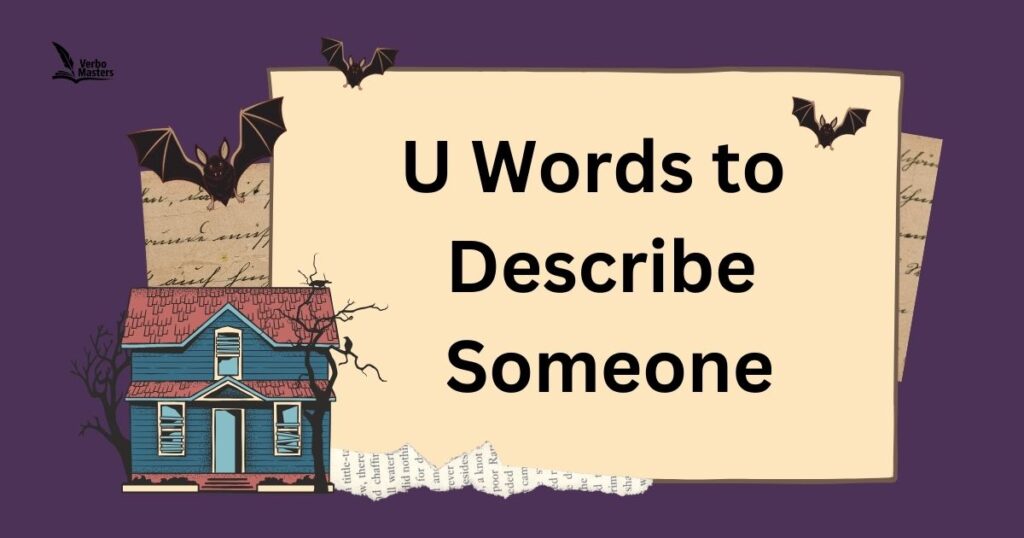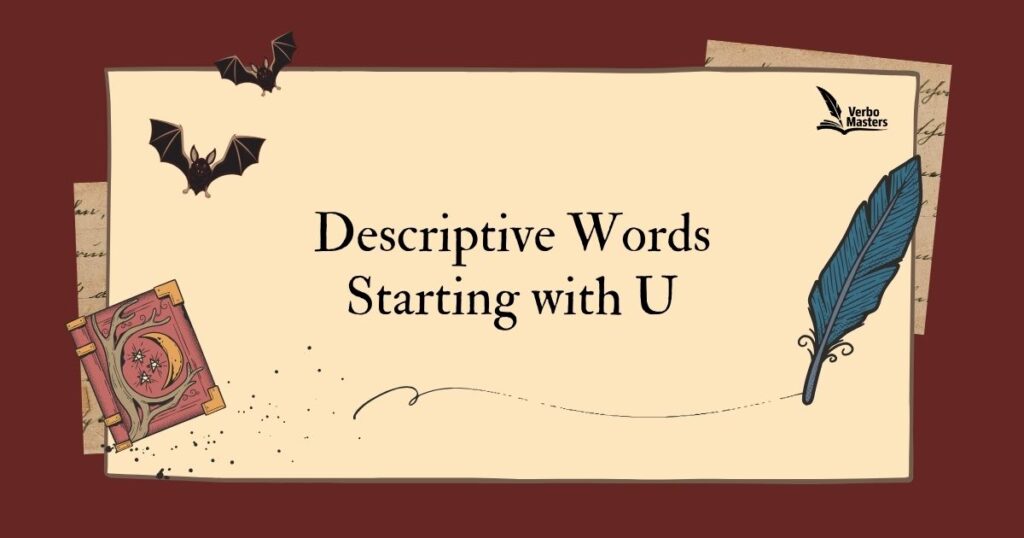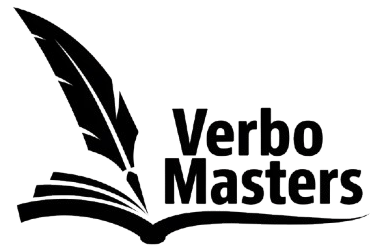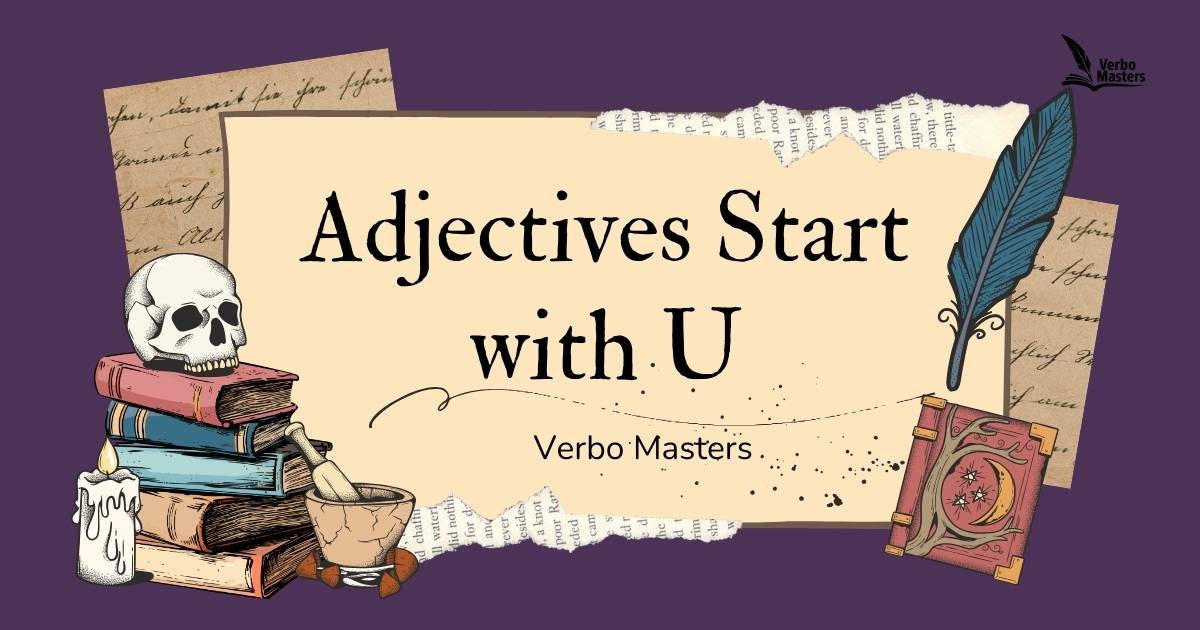Adjectives start with U can describe people, places, and things in creative and meaningful ways. Some carry positive connotations, like uplifting, understanding, and upbeat, while others express challenges or negative traits, such as unfair, unstable, or untidy. These words help make descriptions more vivid and specific, adding depth to both writing and speech.
Many U adjectives relate to personality, emotions, or appearance capturing everything from mood to condition. Words like unpredictable, unusual, useful, and unbelievable show how versatile and expressive these adjectives can be. Some are used in formal or academic contexts, like universal or ultimate, while others are perfect for casual conversation. Expanding your vocabulary with these adjectives can make your communication more colorful, accurate, and engaging.
What Are Adjectives for U?
Adjectives that start with the letter U help describe qualities, characteristics, and conditions with clarity and style. These words can highlight both positive traits, such as understanding or unique, and negative ones, like unreliable or unpleasant. Some U adjectives are common in everyday conversation, while others are more suited to formal writing or creative expression.
They enrich your vocabulary by offering more precise and expressive ways to describe people, places, and things. Here are 25 adjectives that start with U to add variety and depth to your writing or speech:
- Unique – Something different or one-of-a-kind
- Uplifting – Making you feel happy or hopeful
- Urgent – Needing immediate attention
- Unusual – Not common or regular
- Unstable – Lacking stability or security
- Unkind – Lacking kindness
- Ultimate – The best or highest possible
- Unpredictable – Difficult to anticipate
- Useful – Practical and helpful
- Unbearable – Too painful or difficult to handle
- Unfinished – Not completed or fully done
- Unbreakable – Impossible to break
- Unmatched – Without an equal in quality
- Upright – Honest and morally strong
- Unfamiliar – Not recognized or known
- Untidy – Messy or not well-organized
- Unforgettable – Impossible to forget due to its impact
- Uncomfortable – Causing discomfort or unease
- United – Joined together for a common cause
- Unwelcome – Not invited or unwanted
- Unimpressed – Not feeling admiration
- Unstoppable – Impossible to defeat or slow down
- Untrustworthy – Not reliable or honest
- Unnatural – Not normal or expected
- Unbiased – Fair and impartial
Adjectives Start with U
Adjectives starting with the letter U can bring flair, precision, and variety to your language. These words go beyond the basics—they can describe physical traits, emotional states, abstract qualities, or even unique conditions that are hard to capture otherwise. Whether you’re describing a person, event, idea, or object, U adjectives help make your writing and speech more vivid, expressive, and specific.
Here are 25 useful adjectives that start with U to enhance your vocabulary and elevate your descriptions:
- Unique – Different from everything else
- Unusual – Rare or uncommon
- Uplifting – Inspires positive feelings
- Urgent – Needing immediate attention
- Unstable – Lacking stability
- Unkind – Lacking kindness or consideration
- Ultimate – The best or most extreme version
- Unpredictable – Hard to foresee or guess
- Useful – Beneficial or helpful in some way
- Unbearable – Too hard to endure
- Unfinished – Not completed yet
- Unbreakable – Impossible to break or shatter
- Unmatched – Without equal
- Upright – Honest and moral
- Unfamiliar – Not well known or recognized
- Untidy – Messy or disorganized
- Unforgettable – Impossible to forget due to its significance
- Uncomfortable – Not pleasant or causing discomfort
- United – Working together as one
- Unwelcome – Not invited or desired
- Unimpressed – Not feeling admiration
- Unstoppable – Cannot be stopped or defeated
- Untrustworthy – Not deserving of trust
- Unnatural – Not typical or normal
- Unbiased – Fair and objective
These adjectives help us articulate feelings, traits, and qualities clearly, making our writing and speech more colorful and expressive.
You can also read; Abbreviation for Center? Definition & Meaning
Positive Adjectives Start With U
Positive adjectives that start with U are great for describing people, places, and things in an uplifting and encouraging way. These words highlight qualities that bring out joy, confidence, admiration, or warmth. Whether you’re complimenting someone’s character, describing an inspiring situation, or simply adding a cheerful tone to your writing, these adjectives help you express positivity with clarity and charm.
Here are 25 positive adjectives that start with U to brighten your language and make your communication more encouraging and expressive:
- Uplifting – Inspiring happiness or hope
- Unbelievable – So extraordinary it’s hard to believe
- Understanding – Compassionate and empathetic
- Unique – One of a kind, special
- Upstanding – Honest and morally strong
- Unstoppable – Impossible to defeat or slow down
- United – Working together in harmony
- Unselfish – Putting others’ needs before your own
- Ultimate – The best, final, or most important
- Unwavering – Strong, firm, and steady
- Useful – Practical, providing help
- Unfailing – Consistently dependable
- Unmatched – Without an equal
- Uplifted – Feeling elevated or happy
- Unconventional – Original and different from the norm
- Understanding – Showing sympathy and care
- Unparalleled – Having no equal or match
- Unbreakable – Impossible to damage or defeat
- Unstinting – Generous without hesitation
- Undying – Eternal or lasting forever
- Unpretentious – Humble and without arrogance
- Untarnished – Not spoiled or damaged
- Unequaled – Without any equal
- Unflappable – Calm under pressure
- Unmistakable – Clear and easy to recognize
These positive adjectives are perfect for giving compliments, describing people or experiences with praise, or conveying optimism in writing.
Negative Adjectives Starting With U
Negative adjectives beginning with U are used to describe qualities, behaviors, or situations that are less than ideal or reflect undesirable traits. While positive adjectives uplift and inspire, these words serve a different but equally important purpose: they help us clearly express dissatisfaction, concerns, or challenges. Whether you’re writing about a difficult person, an uncomfortable experience, or a flawed system, these adjectives allow you to communicate with accuracy and honesty.
Here are 25 negative adjectives that start with U to help you describe troubling traits, flaws, or situations more effectively:
- Unstable – Lacking stability, not secure
- Unkind – Not friendly or considerate
- Unpredictable – Impossible to anticipate
- Unfair – Not just or equitable
- Untrustworthy – Not reliable or honest
- Uncomfortable – Causing discomfort or unease
- Unpleasant – Not enjoyable or agreeable
- Unimpressive – Not making a strong impression
- Uncooperative – Not willing to work with others
- Undependable – Unreliable, unable to be trusted
- Unacceptable – Not satisfactory or tolerable
- Unfortunate – Causing or involving misfortune
- Unhappy – Feeling sad or dissatisfied
- Unfit – Not suitable or healthy
- Untidy – Messy or disorganized
- Unclean – Dirty or unkempt
- Unbelievable – So extraordinary it is hard to accept
- Unattractive – Lacking appeal or charm
- Unqualified – Lacking the necessary skills or experience
- Unfocused – Lacking concentration or direction
- Unwanted – Not desired or needed
- Unreasonable – Not logical or fair
- Uncertain – Lacking confidence or clarity
- Uncontrolled – Not restrained or managed
- Unrepentant – Not showing remorse for wrong actions
These negative adjectives can help you communicate when things go wrong, or to highlight areas that need improvement. Use them thoughtfully to add clarity to your writing or speech.
U Words to Describe Someone

When describing a person, adjectives that start with the letter U can highlight different aspects of their personality, character, or appearance. These words help you express positive traits such as someone being understanding or upbeat as well as negative qualities like unkind or unreliable. By choosing the right adjective, you can paint a clearer and more vivid picture of who someone is.
Using U adjectives makes your descriptions more expressive, allowing you to communicate your impressions and insights about a person in a thoughtful and meaningful way.
- Understanding – Compassionate and empathetic
- Upstanding – Morally upright, honorable
- Unique – One-of-a-kind, special
- Unpredictable – Hard to guess or anticipate
- Uplifting – Encouraging and inspiring
- Unselfish – Putting others before oneself
- Untrustworthy – Not reliable or honest
- Unpretentious – Modest, without arrogance
- Uncooperative – Not willing to work with others
- Unimpressive – Lacking the ability to impress others
- Uptight – Stressed or anxious
- Unreliable – Not dependable
- Unapproachable – Difficult to talk to or get close to
- Untidy – Messy or disorganized
- Unassuming – Not showy or arrogant
- Unyielding – Firm, determined, not giving up
- Unpleasant – Not enjoyable or agreeable
- Unsympathetic – Lacking empathy
- Unbalanced – Lacking harmony or stability
- Unfashionable – Not following current trends
- Undependable – Not able to be trusted
- Unfriendly – Not warm or welcoming
- Ungrateful – Not showing appreciation
- Undistinguished – Lacking special qualities
- Uptempo – Energetic, lively, full of energy
These adjectives can help you describe a person’s strengths or weaknesses and behavior in different settings, making your conversations and writing more detailed and meaningful.
Character Traits Adjectives Starting with U
Character trait adjectives that begin with the letter U are useful for describing a person’s inner qualities such as their values, attitudes, and patterns of behavior. These words can express how someone interacts with others, responds to challenges, or carries themselves in everyday life. Whether you’re writing a character analysis, preparing a performance review, or simply describing a friend, these adjectives help paint a more accurate and meaningful picture of a person’s core traits.
- Understanding – Compassionate and empathetic
- Upright – Honest and moral
- Unselfish – Putting others before oneself
- Unyielding – Persistent and firm in their beliefs
- Unpretentious – Modest, not showy
- Unbiased – Fair and impartial
- Unstoppable – Relentless in pursuing goals
- Untamed – Wild, free-spirited
- Uplifting – Bringing positivity to others
- Unwavering – Strong and steady in their convictions
- Unfriendly – Not approachable or warm
- Unreliable – Lacking dependability
- Unkind – Harsh or inconsiderate
- Uncompromising – Not willing to make concessions
- Unpretentious – Not seeking attention or admiration
- Unruly – Disorderly or rebellious
- Unconcerned – Lacking worry or anxiety
- Untroubled – Calm and free of stress
- Unaware – Not conscious or mindful
- Unappreciative – Not showing gratitude
- Unequaled – Without equal in their traits
- Unstable – Lacking emotional or mental stability
- Untrustworthy – Unreliable or dishonest
- Undisciplined – Lacking self-control or order
- Uncooperative – Refusing to work with others
These adjectives are great for describing a person’s attitude or behavior, helping to paint a picture of their true character.
Personality Traits Starting with U
Adjectives that start with the letter U are useful for describing a person’s personality traits, including how they behave, interact with others, and express themselves. These traits define what makes someone unique and often influence how they are perceived in different settings. Words like upbeat, understanding, or unpredictable offer insight into someone’s character whether you’re describing them in a personal, professional, or fictional context.
Understanding and using these adjectives can improve communication, support relationship-building, and help in both self-awareness and evaluating others. They’re especially helpful in writing, conversations, and assessments where personality matters.
- Understanding – Compassionate and empathetic
- Upbeat – Positive and full of energy
- Unpredictable – Difficult to anticipate or expect
- Uptight – Anxious or overly concerned
- Unyielding – Determined, not easily swayed
- Unselfish – Caring for others’ well-being
- Uncooperative – Resistant to working with others
- Unstoppable – Full of energy and persistence
- Unimaginative – Lacking creativity or originality
- Untamed – Wild and uncontrolled
- Unreliable – Not dependable or trustworthy
- Upright – Honest, moral, and ethical
- Unapproachable – Hard to get close to or talk with
- Undependable – Untrustworthy or inconsistent
- Unbalanced – Lacking emotional stability or calmness
- Unassuming – Modest and not seeking attention
- Unpredictable – Changeable and erratic
- Unflappable – Calm, even in difficult situations
- Untrustworthy – Lacking reliability or honesty
- Unimpressive – Not making a positive impact or impression
- Unappreciative – Not showing gratitude or respect
- Unconcerned – Lacking worry or interest in problems
- Unassertive – Lacking confidence in expressing oneself
- Unsympathetic – Lacking empathy or understanding
- Unfriendly – Cold or distant in interactions
These adjectives offer insight into the various personality traits that define how people act, feel, and interact with the world around them.
Compliments Adjectives That Start With U
When giving compliments, adjectives that start with the letter U can add a fresh and thoughtful touch to your praise. These words are great for recognizing someone’s hard work, kindness, unique talents, or positive energy. Whether you’re writing a note of appreciation, offering encouragement, or simply lifting someone’s spirits, using the right adjective can make your message feel genuine, specific, and uplifting.
- Uplifting – Encouraging and inspiring
- Unbelievable – Amazing and hard to believe
- Unique – One of a kind and special
- Unstoppable – Relentless and full of energy
- Understanding – Compassionate and empathetic
- Upstanding – Honest, noble, and morally strong
- Unselfish – Generous, thinking of others first
- Unpretentious – Modest and not seeking attention
- Ultimate – The best or most perfect
- Unwavering – Steady, consistent, and firm
- Unmatched – Without equal, outstanding
- Undeniable – Impossible to ignore or dispute
- Unstinting – Generous without hesitation
- Unimpeachable – Above reproach, flawless character
- Unyielding – Determined and strong in pursuit
- Unflappable – Calm and unshaken under pressure
- Unblemished – Perfect and free from flaws
- Unforgettable – So good, it leaves a lasting impression
- Unfailing – Consistently reliable and dependable
- Uncompromising – Standing firm for what’s right
- Untarnished – Pure and without damage
- Unequaled – Without any competition, unparalleled
- Unassuming – Humble and modest
- Unparalleled – Having no equal, exceptional
- Undefeated – Invincible and triumphant
Using these adjectives can help you compliment others in a way that makes them feel truly appreciated and valued.
Descriptive Words Starting with U

Descriptive words starting with the letter U are perfect for bringing detail and clarity to your writing or speech. They help paint vivid pictures of places, people, objects, and emotions, making your language more expressive and engaging. Whether you’re describing a unique landscape, an uplifting moment, or a unifying experience, these adjectives add color and depth to your descriptions.
Using U adjectives allows you to create stronger imagery and convey your ideas more precisely. They are especially useful in storytelling, creative writing, and everyday conversation anywhere you want your words to leave a lasting impression.
- Unique – One of a kind, special
- Uplifting – Making someone feel happier or inspired
- Unpredictable – Hard to predict, variable
- Untamed – Wild, not controlled or restrained
- Unbelievable – So extraordinary that it’s hard to believe
- Unseen – Not visible, hidden from view
- Unimaginable – Beyond what can be imagined or expected
- Unsettling – Causing discomfort or unease
- Underwhelming – Not as impressive as expected
- Uneven – Lacking balance or consistency
- Unstable – Lacking stability or reliability
- Unusual – Not common, rare
- Unyielding – Strong, determined, unbending
- Unclean – Dirty or messy
- Unsanitary – Not clean or healthy
- Unattractive – Lacking in appeal or beauty
- Uptempo – Fast-paced or lively
- Underdeveloped – Not fully developed or matured
- Unfamiliar – Not recognized or known
- Unwieldy – Difficult to manage or handle
- Untidy – Messy or unorganized
- Unimpressive – Failing to make a strong impact
- Unflattering – Making someone or something look worse than they are
- Undistinguished – Lacking special qualities
- Unforgettable – Memorable, leaving a lasting impression
These adjectives allow you to describe people, situations, and experiences with a more detailed and nuanced approach.
Tips for Using Adjectives Effectively
Using adjectives effectively can make your writing or speech more engaging and impactful. These descriptive words clarify, emphasize, and bring life to the nouns they modify, helping your audience visualize and understand your message better. When used thoughtfully, adjectives can add emotion, tone, and precision to your communication.
However, overusing adjectives can clutter your language and dilute your message. Strategic use of the right adjectives at the right time keeps your writing clear, expressive, and balanced. Whether you’re crafting a story, delivering a speech, or having a conversation, choosing adjectives wisely allows your words to resonate more powerfully.
- Be specific – Use precise adjectives to give a clear image
- Avoid redundancy – Don’t use multiple adjectives with the same meaning
- Don’t overdo it – Limit the use of adjectives to avoid clutter
- Use strong adjectives – Choose adjectives that make a strong impact
- Keep it relevant – Use adjectives that directly relate to the subject
- Balance with nouns – Don’t let adjectives overwhelm the nouns they describe
- Show, don’t tell – Use descriptive adjectives to show characteristics, not just state them
- Use adjectives for emphasis – Highlight important aspects of a subject
- Vary your adjectives – Avoid repetition by mixing up adjectives
- Consider tone – Choose adjectives that fit the tone of your message
- Use them in moderation – Ensure adjectives enhance rather than distract
- Be concise – Don’t use too many adjectives in a single sentence
- Use comparative adjectives – Compare qualities for a richer description
- Be mindful of connotations – Choose adjectives with the right emotional impact
- Use sensory adjectives – Engage the senses with adjectives related to sight, smell, taste, touch, and sound
- Consider the context – Use adjectives that fit the setting and audience
- Use adjectives for variety – Avoid using the same descriptive words repeatedly
- Be aware of the subject – Tailor your adjectives to match the subject being described
- Avoid cliches – Stay away from overused or generic adjectives
- Use them sparingly in professional writing – Too many adjectives can weaken the tone
- Choose adjectives that fit the genre – In storytelling, use adjectives to set the mood and atmosphere
- Avoid negative adjectives when possible – Focus on the positive qualities unless describing a flaw
- Use adjectives to create mood – Use them to evoke emotions like joy, sadness, or suspense
- Use superlative adjectives for emphasis – Express the highest degree of quality
- Be mindful of word choice – Ensure that adjectives are suitable and clear in meaning
These tips will help you use adjectives to make your writing more effective, impactful, and descriptive without overloading your audience with unnecessary details.
FAQs
What are adjectives that start with U?
Adjectives that start with the letter U are words used to describe or modify nouns. These adjectives can help to provide more detail and meaning when talking about a person, place, thing, or idea. Examples include words like understanding, unique, upbeat, and unpredictable.
What are some positive adjectives starting with U?
Positive adjectives starting with U include words like upbeat, understanding, unselfish, unbelievable, and uplifting. These adjectives describe qualities that are helpful, optimistic, and inspiring.
Can you give me some negative adjectives that start with U?
Some negative adjectives starting with U include words like unreliable, unpredictable, unfriendly, unstable, and untrustworthy. These describe qualities that are undesirable or challenging.
How can I use adjectives starting with U to describe someone’s personality?
To describe someone’s personality, adjectives starting with U can be used to convey their characteristics and how they interact with others. For example, you can say someone is understanding (compassionate) or unpredictable (hard to anticipate).
What is an example of a compliment using U adjectives?
A compliment using an adjective starting with U might be: “You’re always so uplifting, and your presence truly brightens the room.” This focuses on someone’s positive energy and impact.
Are there any adjectives starting with U for describing emotions?
Yes, adjectives starting with U can describe emotions. For example, unsettling describes an emotion of discomfort or unease, and unforgettable can refer to strong, lasting emotions after an experience.
How do I use adjectives starting with U effectively?
To use adjectives starting with U effectively, choose words that enhance your description without overcrowding the sentence. Be specific, avoid overusing them, and make sure they match the context of your conversation or writing.
What are some U adjectives that describe an object or place?
For objects or places, you can use adjectives like uneven, unusual, untidy, or unfamiliar. These words help convey the condition, state, or appearance of something.
Why are adjectives important in language?
Adjectives are important because they help define and modify nouns, making your language clearer and more vivid. They allow you to give specific details about a person, object, or experience, making communication richer and more expressive.
Can adjectives starting with U help improve my writing?
Yes, using adjectives starting with U can improve your writing by adding variety and helping to create stronger imagery. These words can make your descriptions more dynamic and detailed, which engages your readers more effectively.
Conclusion
Adjectives starting with U offer a versatile set of words to describe people, places, emotions, and experiences. Whether you’re using uplifting to inspire or unpredictable to add intrigue, these adjectives help bring color and depth to your language. They allow you to express thoughts and feelings more vividly, making your writing or speech more engaging and precise.
By choosing words like understanding, unique, or unsettling, you can shape clearer mental images and communicate your message with greater impact. Used thoughtfully, U adjectives enhance storytelling, strengthen expression, and add emotional weight to what you say or write. The right word truly can make all the difference.

I’m John Smith, a language enthusiast dedicated to helping writers, students, and professionals master the art of clear and effective communication. Whether you’re looking for grammar tips, writing guides, or common mistake corrections, you’ll find valuable insights to improve your language skills. Let’s make grammar simple and fun!

